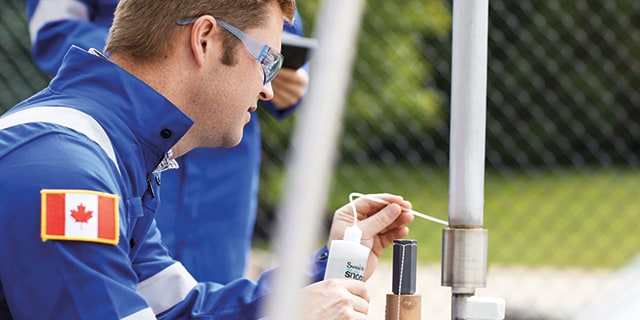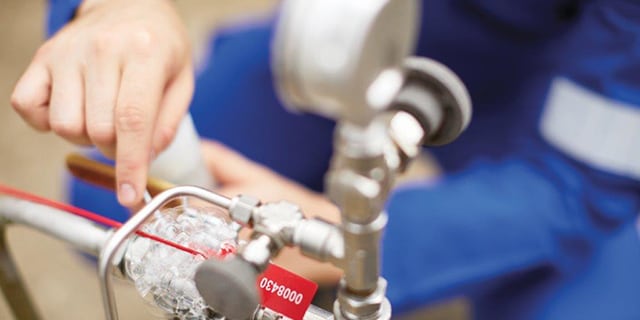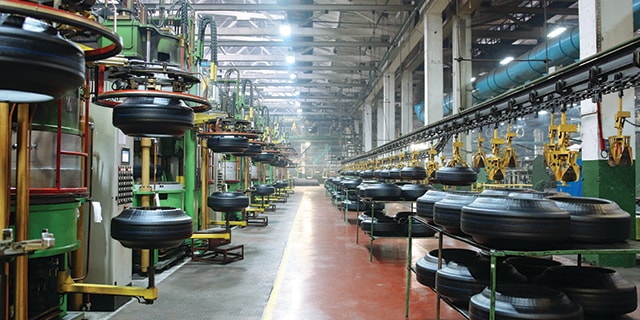Gas Plant Saves 90% on Labor, Eliminates Leaks

Major Natural Gas Processor Eliminates Hundreds of Leaks and Saves 90% on Labor Time
One of the most time-consuming parts of a plant turnaround involves checking for leakage at all connection points after fluid systems have been reassembled with new or refurbished parts. Improper installation and inefficient leak detection processes can result in major costs—and if some leaks go undetected, resulting emissions can result in a safety risk.
So, when it was time for a major natural gas processor to perform a turnaround at a Canadian facility, they turned to Swagelok Calgary to help expedite the leak detection process and ensure proper reinstallation was performed.
The Stakes
Time-Consuming Labor
Testing for leaks on pipe flanges traditionally involves wrapping plastic or tape around each flange in the fluid system, then punching a small hole in the wrap. The system is then pressurized, and technicians monitor the hole for any signs of gas leakage. This process can take up to 30 minutes per flange. Projected across hundreds of flange connections, the labor hours required here can add up quickly. And if a connection was inaccessible or fails to pass inspection, additional time is required—potentially double or triple the standard degree of labor.
Turnaround Efficiency
Since turnaround involves taking processes offline—therefore stopping production—it is in any owner/operator’s best interest to complete these projects as efficiently as possible. Protracted turnaround projects also might involve keeping contractors on-site for longer, increasing cost and risk.
The Solutions
Faster, Effective Leak Detection
To expedite leak testing and to ensure all fluid systems were reassembled safely and correctly, Swagelok Calgary recommended conducting an energy emissions survey of the reassembled system rather than using the traditional detection method. Armed with specialized equipment to expedite leak testing, the Swagelok team maximized scheduling efficiency with the company’s contracted workforce.
Actionable Knowledge
Locating leaks is only part of the value provided by a fluid system evaluation. Via a standard, detailed report provided with all Swagelok® evaluation and advisory services, Swagelok Calgary helped identify root causes—most commonly, leaking flanges were associated with suboptimal installation—and developed a prioritized plan to help the customer fix and prevent future reoccurrences. With this actionable knowledge, the customer was well prepared to eliminate emissions and improve plant safety.
The Results
Hundreds of Leaks Eliminated
Swagelok Calgary dramatically reduced the amount of time required to conduct leak testing as the customer’s plant was brought back online. The team surveyed 650 flange connections of various sizes using specialized equipment, and leak tests that pinpointed exact locations of leaks were performed in less than three minutes. Meanwhile, a team of on-site installers addressed each detected leak prior to reverification. Of the 650 connections tested, 157 were found to have leaks and were repaired and retested to ensure they were leak-free.
Major Labor and Time Savings
Swagelok’s method for testing the flange connections reduced an estimated 325 hours of labor across 650 connections to approximately 32.5 hours of work—a 90% reduction in labor time, yielding a considerable cost-savings for the customer. Swagelok also helped the customer quantify their energy and gas losses and prioritized those that can make the biggest impact on the bottom line.
A Plan for Future Action
As a result of the leak detection survey, the natural gas processor developed a plan to have Swagelok evaluation and advisory services conducted throughout other areas of the plant as a part of the turnaround. Having saved significant time on leak testing, the plant was able to continue its turnaround work ahead of schedule.
By utilizing Swagelok evaluation and advisory services, the natural gas processor stayed ahead of its turnaround schedule and achieved leak-free fluid system operation. Safety was improved, emissions were reduced, and fluid system issues were addressed before systems came back online, increasing the likelihood that they operate as intended for the long term.
Interested in exploring how you could benefit from a similar leak detection project? Get in touch to learn more.
Related Articles

Common Causes and Costs of Fluid System Leaks
The smallest leak can present a serious issue when maintaining your plant’s safety and profitability. Understand how and why leaks occur, how to locate and test for them, and ultimately how to develop a strategy to address and reduce leaks plant-wide.

Identifying Cost Savings in Utility Gas Systems
See how Swagelok Texas Mid-Coast provided on-site analyses of a major petrochemical producer’s aging utility gas system and uncovered savings of more than $2 million annually.

Combating Common Fluid System Leaks in Tire Facilities
Tire manufacturers can grow accustomed to leaking process pipes, but system leaks can pose significant safety hazards and drain profitability. Learn how to identify common leak sources throughout a plant and how to fix them.


